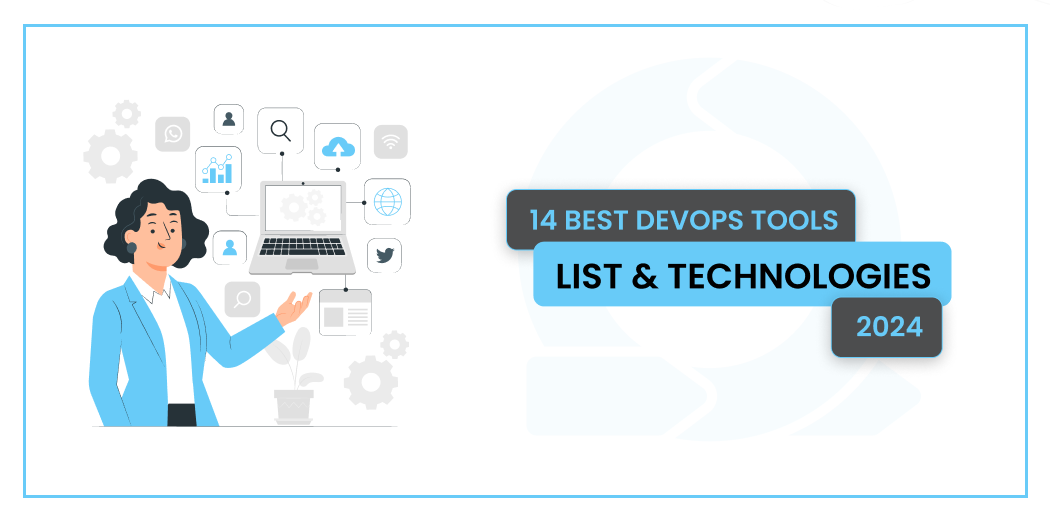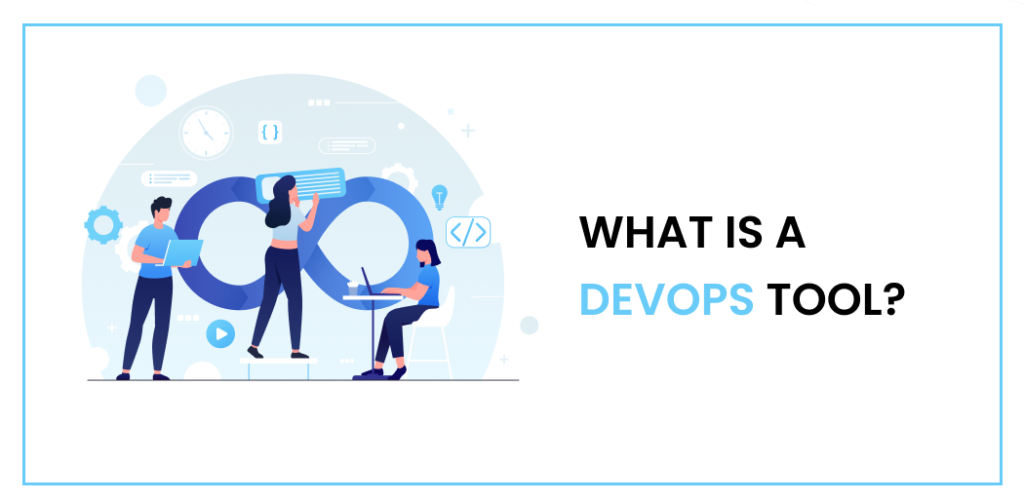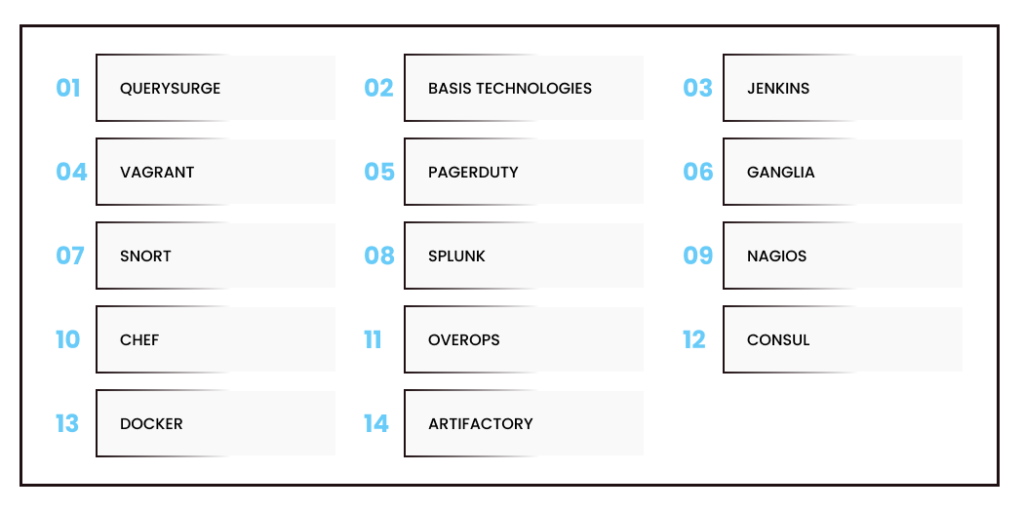How to Implement Flutter In-App Purchases Using Qonversion
May 10, 2024
Home >> DevOps >> 14 Best DevOps Tools List & Technologies 2024

Have you ever encountered a slow and faulty application? It depresses us and slows us down. Here we have gathered some of the finest DevOps tools list that you can explore. What’s more troubling is the lack of a solution for how to fix this sluggish software. The channel of communication between management processes and customer satisfaction execution should be smooth and bug-free.
Top DevOps tools aid in providing relief in this chaotic management. Here you can evaluate and implement DevOps new tools which can be used to automate the processes. It is critical for businesses and manufacturers to use the best DevOps tools to improve and increase efficiency.
DevOps is one of the most popular methods for IT companies to deploy applications. As the DevOps technologies list is constantly growing many entrepreneurs are using these tools while developing their websites. DevOps is frequently confused with a tool, but it is not one. Nowadays DevOps are using different types of DevOps productivity tools to increase their overall productivity. DevOps is a software development methodology that promotes agile communication between developers and operations teams through the use of DevOps tools. This blog will further lead you to the DevOps tool list so that you can choose the best tools for DevOps which are suitable for your project.

A DevOps Tool is a program that aids in the automation of the software development process. Here you can see a personalized list of DevOps tools and technologies with their key features. It primarily focuses on communication and collaboration among professionals in product management, software development, and operations. DevOps tools also allow teams to automate most software development processes such as build, conflict management, dependency management, deployment, and so on, reducing manual labor.

Below find the DevOps tool list with their key features:
QuerySurge is a smart data testing solution and the first full DevOps solution for continuous data testing.
Key Features:
This one is probably one of the best tools for DevOps. Basis Technologies provides the only SAP-specific DevOps and test automation platform. ActiveControl, their DevOps for SAP tool, enables businesses to transition their SAP applications from fixed-release cycles to an on-demand delivery model based on CI/CD and DevOps.
Key Features:
Jenkins is a DevOps tool that monitors the execution of repetitive tasks. It is one of the most preferable devops deployment tools that is mainly used to deploy projects easily. It is one of the best software deployment tools for making it easier to integrate project changes by quickly identifying issues.
Key Features:
Vagrant is a tool of DevOps. It is one of the most effective DevOps tools for creating and managing virtual machine environments in a single workflow. It provides a simple workflow and focuses on automation. Vagrant reduces the time it takes to set up a development environment and increases production parity.
Key Features:
PagerDuty is a tool of DevOps that assists companies in improving their brand reputation. The majority of developers prefer to use these tools because it is one of the best devops management tools for better management. It is an incident management solution supporting a continuous delivery strategy. It also enables DevOps teams to deliver high-performance applications.
Key Features:
In the list of tools DevOps, Ganglia DevOps tooling provides cluster and grid monitoring capabilities to teams. This tool is intended for use with high-performance computing systems such as clusters and grids.
Key Features:
Snort is a very powerful open-source tool of DevOps for detecting intruders. It is one of the best DevOps tools for detecting malicious attacks on the system. It is one of the most effective software deployment tools for real-time traffic analysis and packet logging.
Key Features:
In search of top-tier DevOps Solutions?
Contact us today to unlock seamless DevOps solutions for your development challenges!
Splunk is a tool for making machine data accessible, usable, and valuable to all. It is one of the most effective DevOps technologies for providing operational intelligence to DevOps teams. It is one of the best software deployment tools for making businesses more productive, competitive, and secure.
Key Features:
When talking about tools devops, Nagios is another useful DevOps tool. It assists DevOps teams in identifying and correcting network and infrastructure issues.
Key Features:
Chef is an excellent DevOps tool for increasing speed, scale, and consistency. It is a system that is hosted in the cloud. It is one of the best DevOps automation tools for simplifying and automating complex tasks.
Key Features:
OverOps is a DevOps tool that identifies the root cause of a bug and notifies the team of a server crash. It quickly pinpoints when and why code fails in production.
Key Features:
Consul is a tool for DevOps. It is widely used in any infrastructure for discovering and configuring services. It is an ideal tool for modern, elastic infrastructures, as well as the DevOps community.
Key Features:
Docker is a technology suite for DevOps. It is one of the most used DevOps tools which can be used to store caches. It enables DevOps teams to create, deploy, and run distributed applications. Users can use this tool to assemble apps from components and collaborate on them.
Key Features:
Artifactory is one of the tools of DevOps. The enterprise-ready repository manager is Artifactory. It offers a complete, automated solution for tracking artifacts from development to production.
Key Features:

Here are some things to think about when selecting the DevOps tools for your team:

When selecting the best DevOps tools, keep the following factors in mind:
To explore further tools of DevOps it is important to notice that DevOps is made up of two key terms: ‘Development’ and ‘Operations,’ both of which are crucial in the IT infrastructure. The aim behind accumulating these popular DevOps tools list is to understand a smoother and more efficient way to run organizations and their businesses. They are automated, dependable, and self-service tools that enable users to expect high accuracy with minimal manual effort.
In conclusion, I would like to say that DevOps tools are important because they play a very crucial role in the automation of the software development cycle. You can hire DevOps developers for your business as they use the latest technologies to integrate with other tools and systems. While choosing the DevOps tools you need to consider the aspects like performance, customization capabilities, price, and many more.
As a beginner learning how to use DevOps tools, you must learn everything about Linux because it will aid your overall understanding of them.
The majority of DevOps tools are free and open source, but a paid version gives you access to even more amazing features.

Digital Valley, 423, Apple Square, beside Lajamni Chowk, Mota Varachha, Surat, Gujarat 394101
+91 9913 808 2851133 Sampley Ln Leander, Texas, 78641
52 Godalming Avenue, wallington, London - SM6 8NW